人教版(2019)必修第三册 Unit3 Diverse Cultures 易混易错点辨析学案(有解析)
文档属性
| 名称 | 人教版(2019)必修第三册 Unit3 Diverse Cultures 易混易错点辨析学案(有解析) |
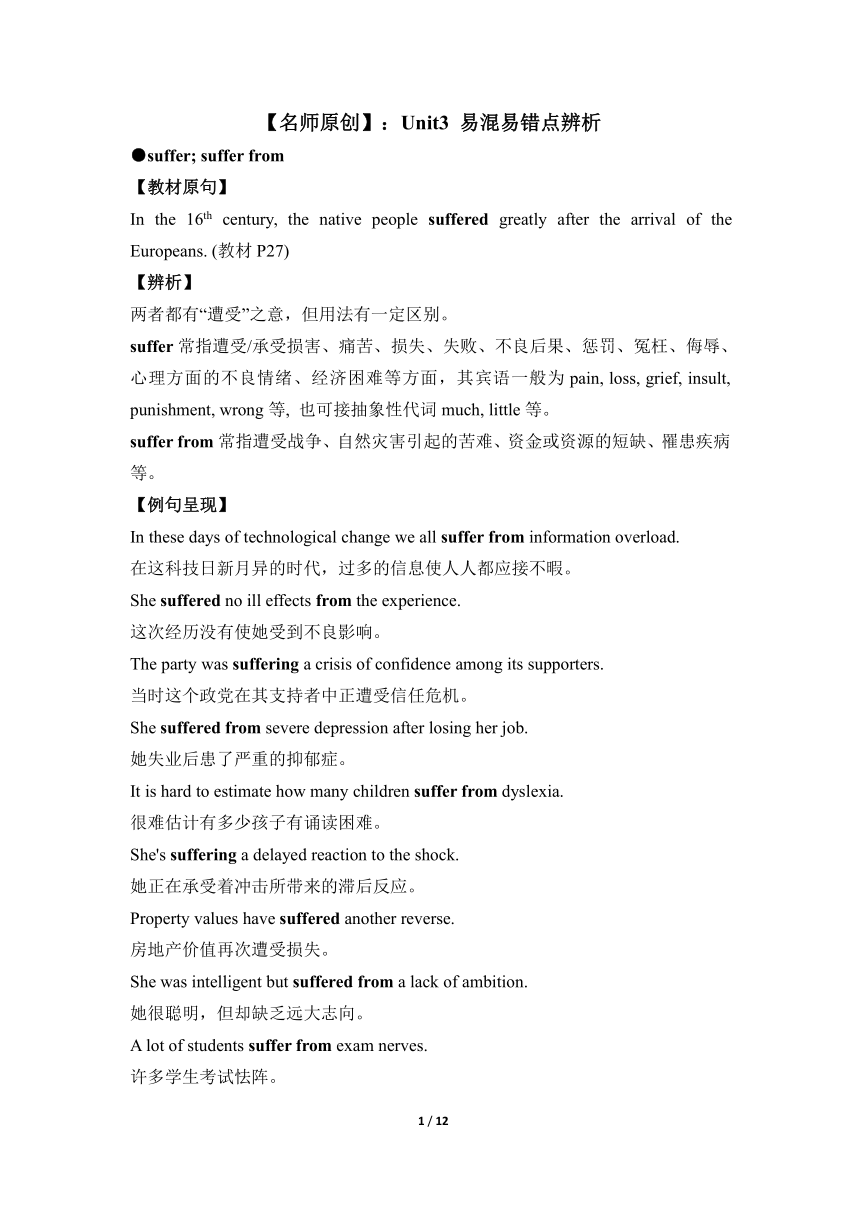
|
|
| 格式 | doc | ||
| 文件大小 | 81.5KB | ||
| 资源类型 | 教案 | ||
| 版本资源 | 人教版(2019) | ||
| 科目 | 英语 | ||
| 更新时间 | 2023-03-10 18:32:45 | ||
图片预览

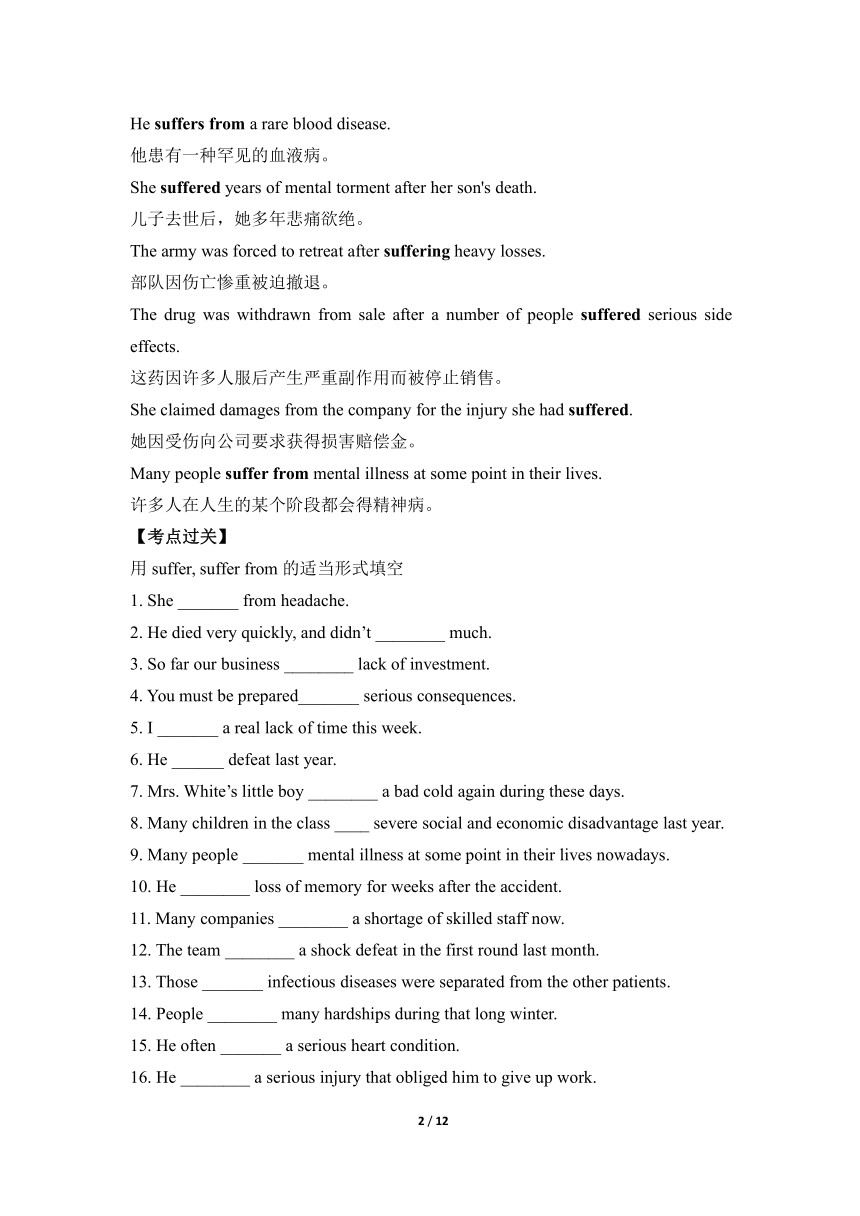
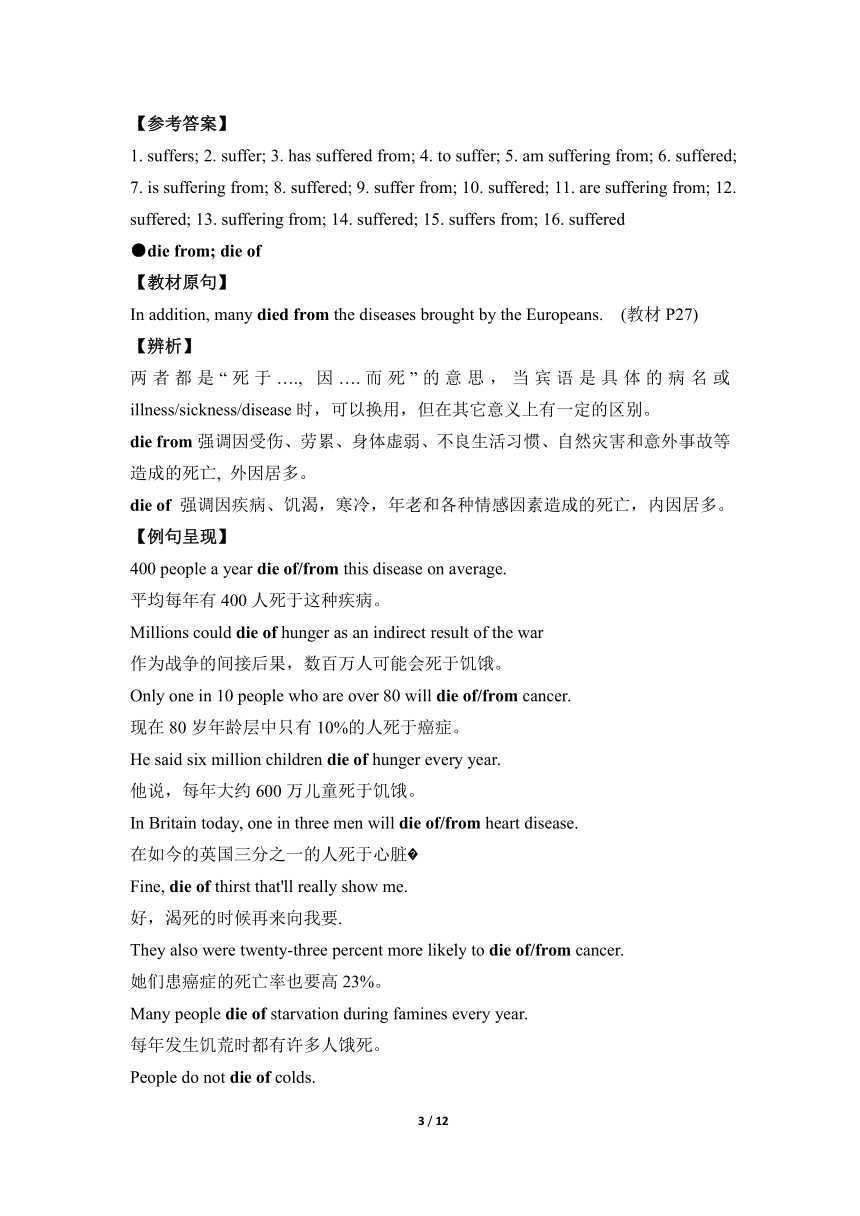
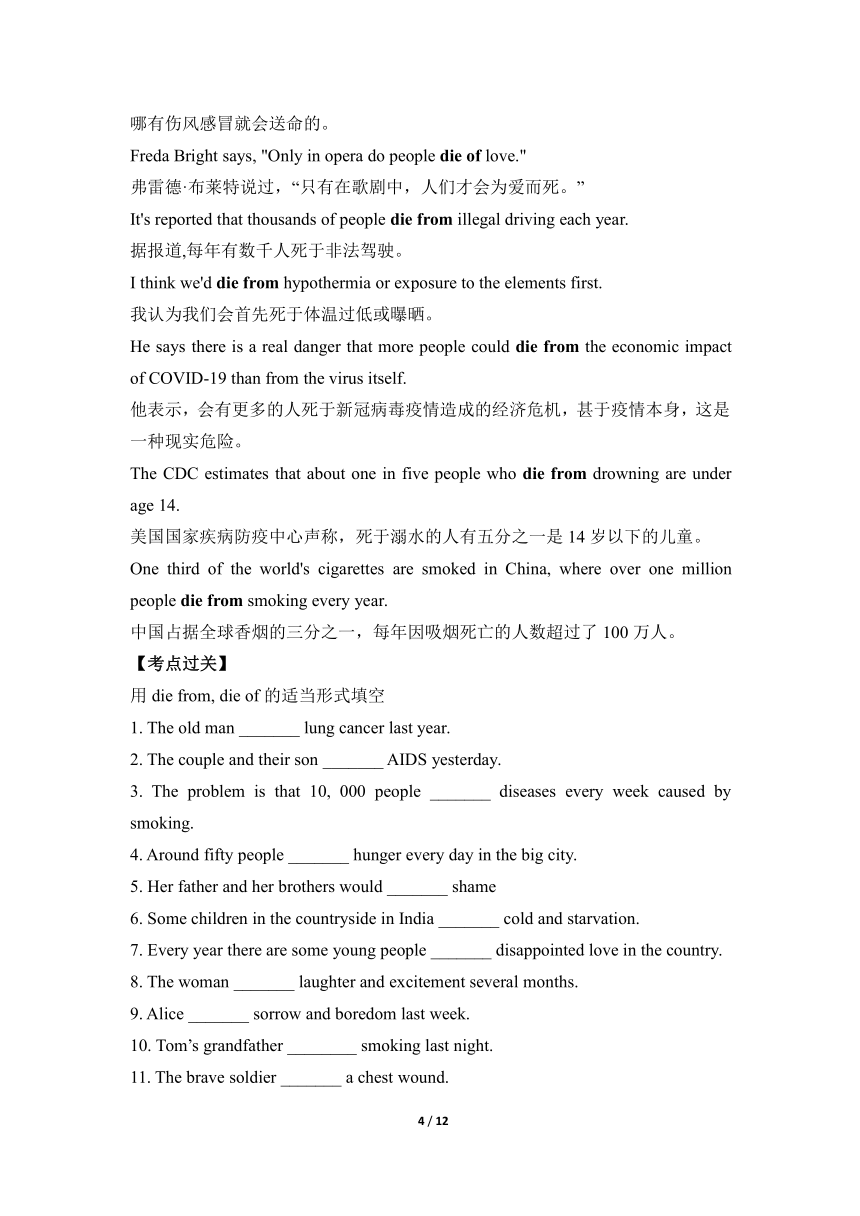
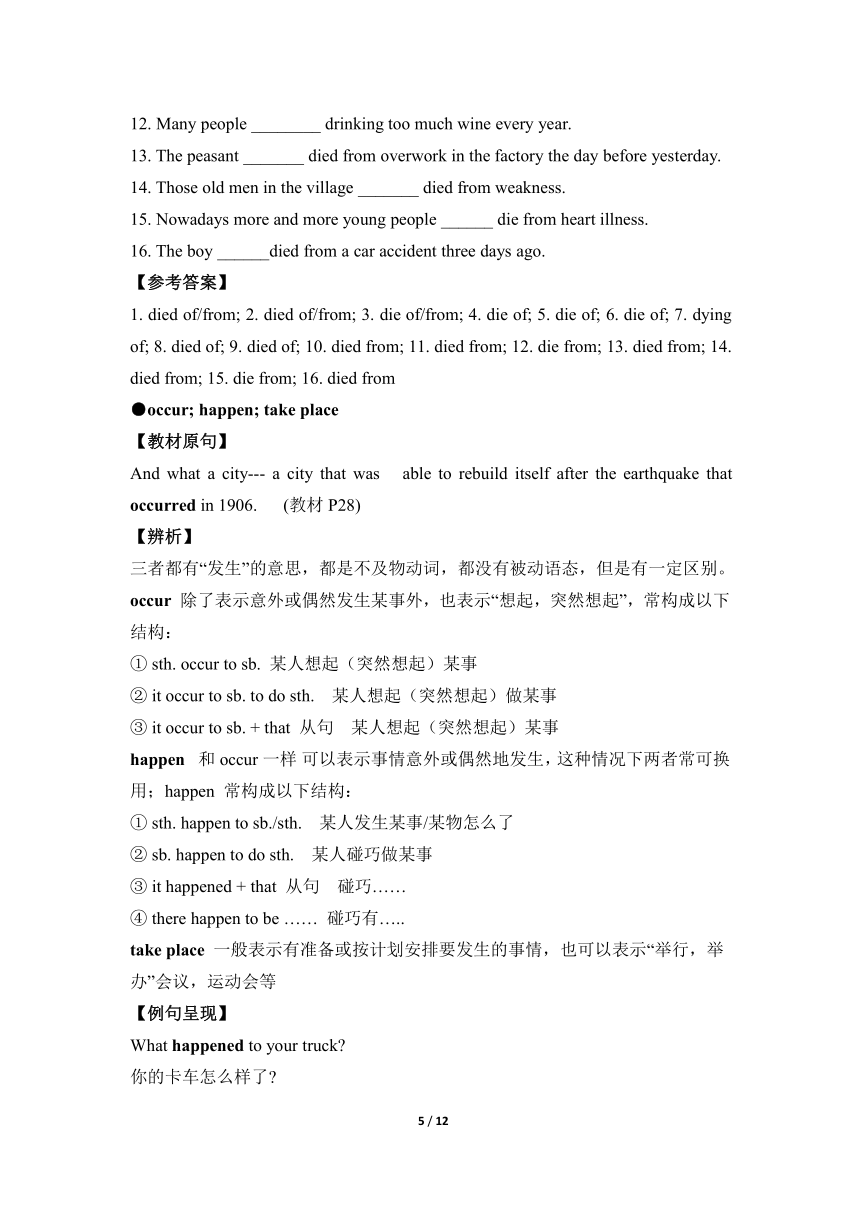
文档简介
【名师原创】:Unit3 易混易错点辨析
●suffer; suffer from
【教材原句】
In the 16th century, the native people suffered greatly after the arrival of the Europeans. (教材P27)
【辨析】
两者都有“遭受”之意,但用法有一定区别。
suffer常指遭受/承受损害、痛苦、损失、失败、不良后果、惩罚、冤枉、侮辱、心理方面的不良情绪、经济困难等方面,其宾语一般为pain, loss, grief, insult, punishment, wrong等, 也可接抽象性代词much, little等。
suffer from常指遭受战争、自然灾害引起的苦难、资金或资源的短缺、罹患疾病等。
【例句呈现】
In these days of technological change we all suffer from information overload.
在这科技日新月异的时代,过多的信息使人人都应接不暇。
She suffered no ill effects from the experience.
这次经历没有使她受到不良影响。
The party was suffering a crisis of confidence among its supporters.
当时这个政党在其支持者中正遭受信任危机。
She suffered from severe depression after losing her job.
她失业后患了严重的抑郁症。
It is hard to estimate how many children suffer from dyslexia.
很难估计有多少孩子有诵读困难。
She's suffering a delayed reaction to the shock.
她正在承受着冲击所带来的滞后反应。
Property values have suffered another reverse.
房地产价值再次遭受损失。
She was intelligent but suffered from a lack of ambition.
她很聪明,但却缺乏远大志向。
A lot of students suffer from exam nerves.
许多学生考试怯阵。
He suffers from a rare blood disease.
他患有一种罕见的血液病。
She suffered years of mental torment after her son's death.
儿子去世后,她多年悲痛欲绝。
The army was forced to retreat after suffering heavy losses.
部队因伤亡惨重被迫撤退。
The drug was withdrawn from sale after a number of people suffered serious side effects.
这药因许多人服后产生严重副作用而被停止销售。
She claimed damages from the company for the injury she had suffered.
她因受伤向公司要求获得损害赔偿金。
Many people suffer from mental illness at some point in their lives.
许多人在人生的某个阶段都会得精神病。
【考点过关】
用suffer, suffer from的适当形式填空
1. She _______ from headache.
2. He died very quickly, and didn’t ________ much.
3. So far our business ________ lack of investment.
4. You must be prepared_______ serious consequences.
5. I _______ a real lack of time this week.
6. He ______ defeat last year.
7. Mrs. White’s little boy ________ a bad cold again during these days.
8. Many children in the class ____ severe social and economic disadvantage last year.
9. Many people _______ mental illness at some point in their lives nowadays.
10. He ________ loss of memory for weeks after the accident.
11. Many companies ________ a shortage of skilled staff now.
12. The team ________ a shock defeat in the first round last month.
13. Those _______ infectious diseases were separated from the other patients.
14. People ________ many hardships during that long winter.
15. He often _______ a serious heart condition.
16. He ________ a serious injury that obliged him to give up work.
【参考答案】
1. suffers; 2. suffer; 3. has suffered from; 4. to suffer; 5. am suffering from; 6. suffered; 7. is suffering from; 8. suffered; 9. suffer from; 10. suffered; 11. are suffering from; 12. suffered; 13. suffering from; 14. suffered; 15. suffers from; 16. suffered
●die from; die of
【教材原句】
In addition, many died from the diseases brought by the Europeans. (教材P27)
【辨析】
两者都是“死于…., 因….而死”的意思,当宾语是具体的病名或illness/sickness/disease时,可以换用,但在其它意义上有一定的区别。
die from强调因受伤、劳累、身体虚弱、不良生活习惯、自然灾害和意外事故等造成的死亡, 外因居多。
die of 强调因疾病、饥渴,寒冷,年老和各种情感因素造成的死亡,内因居多。
【例句呈现】
400 people a year die of/from this disease on average.
平均每年有400人死于这种疾病。
Millions could die of hunger as an indirect result of the war
作为战争的间接后果,数百万人可能会死于饥饿。
Only one in 10 people who are over 80 will die of/from cancer.
现在80岁年龄层中只有10%的人死于癌症。
He said six million children die of hunger every year.
他说,每年大约600万儿童死于饥饿。
In Britain today, one in three men will die of/from heart disease.
在如今的英国三分之一的人死于心脏
Fine, die of thirst that'll really show me.
好,渴死的时候再来向我要.
They also were twenty-three percent more likely to die of/from cancer.
她们患癌症的死亡率也要高23%。
Many people die of starvation during famines every year.
每年发生饥荒时都有许多人饿死。
People do not die of colds.
哪有伤风感冒就会送命的。
Freda Bright says, "Only in opera do people die of love."
弗雷德·布莱特说过,“只有在歌剧中,人们才会为爱而死。”
It's reported that thousands of people die from illegal driving each year.
据报道,每年有数千人死于非法驾驶。
I think we'd die from hypothermia or exposure to the elements first.
我认为我们会首先死于体温过低或曝晒。
He says there is a real danger that more people could die from the economic impact of COVID-19 than from the virus itself.
他表示,会有更多的人死于新冠病毒疫情造成的经济危机,甚于疫情本身,这是一种现实危险。
The CDC estimates that about one in five people who die from drowning are under age 14.
美国国家疾病防疫中心声称,死于溺水的人有五分之一是14岁以下的儿童。
One third of the world's cigarettes are smoked in China, where over one million people die from smoking every year.
中国占据全球香烟的三分之一,每年因吸烟死亡的人数超过了100万人。
【考点过关】
用die from, die of的适当形式填空
1. The old man _______ lung cancer last year.
2. The couple and their son _______ AIDS yesterday.
3. The problem is that 10, 000 people _______ diseases every week caused by smoking.
4. Around fifty people _______ hunger every day in the big city.
5. Her father and her brothers would _______ shame
6. Some children in the countryside in India _______ cold and starvation.
7. Every year there are some young people _______ disappointed love in the country.
8. The woman _______ laughter and excitement several months.
9. Alice _______ sorrow and boredom last week.
10. Tom’s grandfather ________ smoking last night.
11. The brave soldier _______ a chest wound.
12. Many people ________ drinking too much wine every year.
13. The peasant _______ died from overwork in the factory the day before yesterday.
14. Those old men in the village _______ died from weakness.
15. Nowadays more and more young people ______ die from heart illness.
16. The boy ______died from a car accident three days ago.
【参考答案】
1. died of/from; 2. died of/from; 3. die of/from; 4. die of; 5. die of; 6. die of; 7. dying of; 8. died of; 9. died of; 10. died from; 11. died from; 12. die from; 13. died from; 14. died from; 15. die from; 16. died from
●occur; happen; take place
【教材原句】
And what a city--- a city that was able to rebuild itself after the earthquake that occurred in 1906. (教材P28)
【辨析】
三者都有“发生”的意思,都是不及物动词,都没有被动语态,但是有一定区别。
occur 除了表示意外或偶然发生某事外,也表示“想起,突然想起”,常构成以下结构:
① sth. occur to sb. 某人想起(突然想起)某事
② it occur to sb. to do sth. 某人想起(突然想起)做某事
③ it occur to sb. + that 从句 某人想起(突然想起)某事
happen 和occur一样 可以表示事情意外或偶然地发生,这种情况下两者常可换用;happen 常构成以下结构:
① sth. happen to sb./sth. 某人发生某事/某物怎么了
② sb. happen to do sth. 某人碰巧做某事
③ it happened + that 从句 碰巧……
④ there happen to be …… 碰巧有…..
take place 一般表示有准备或按计划安排要发生的事情,也可以表示“举行,举办”会议,运动会等
【例句呈现】
What happened to your truck
你的卡车怎么样了
There happened to be some people there then.
那时,碰巧有一些人在那里。
It never occurred to her to ask anyone.
她从未想到去问问别人。
It never occurred to me that he might be in trouble.
我怎么也没有想到他会遇上麻烦。
Didn't it occur to you that he was lying
你当时没想到他在撒谎吗?
How did the accident happen/occur
事故是怎样发生的
That plane crash occurred/happened only minutes after take-off.
空难在起飞几分钟后就发生了。
She hoped nothing bad would happen to him.
她希望不会有什么不幸的事发生在他头上。
Olympic Games take place every four years in the world.
奥运会每四年(每隔三年)举行一次。
Great changes have taken place in our country during the past forty years.
过去四十年里,我们的国家发生了巨大变化。
【考点过关】
用happen, occur 和take place的适当形式填空
1. Elections ________ every five years in the country now.
2. It _______ to me that going to Switzerland for traveling will be marvelous!
3. Great changes ________ here since last year.
4. It never _________ to me that he might be in trouble.
5. The severe car accident ________ in the street half an hour ago.
6. What has ________
7. A good idea __________ to them that day.
8. The meeting will ________ next week.
9. It ________ to me to visit my teacher.
10. It didn't _______ to him that she would refuse his invitation.
【参考答案】
1. take place; 2. occurs; 3. have taken place; 4. occurred; 5. happened/occurred; 6. has happened/has occurred; 7. occurred; 8. will take place; 9. occurred; 10. occur
●主语 + used to do; 主语 + be/get used to doing sth.; 主语 + be used to do sth.
【教材原句】
This district used to be a poor area of town, but is now a center for art, music, and food. (教材P28)
【辨析】
主语 + used to do sth. 表示“过去常常”,说明过去经常发生的动作或存在的状态,但现在已经不那样做或已经不存在了。其中的to是不定式符号,后面要接动词原形。它只有过去式一种形式,可以用于所有人称。
主语 + be/get used to sth./doing sth. 表示“习惯于做某事”,to是介词,后面接名词、代词或动名词,be是系动词,可以用于过去、现在、将来的多种时态, 还可以用get, become等词来代替。
主语 + be used to do sth. =主语 + be used for doing sth. 表示“被用来做某事”,是use sth. to do sth. 和use sth. for doing sth.的被动结构。
温馨提示:
①used to do sth. 的疑问式为Did … use to … 或Used … to … 构成;否定式为didn’t use to do sth. 或 usedn’t to do sth.
② there used to be… 表示“过去有….”
【例句呈现】
This powerful drug is used to tranquilize patients undergoing surgery.
这种强效药剂被用来麻醉手术病人。
The test is used to diagnose a variety of diseases.
此项化验可用于诊断多种疾病。
They used to buy ten kilos of beef in one lump.
他们过去常买10公斤重的整块牛肉。
The old-timers used to recall how hot 1886 was.
老人们常常回想起1886年的酷热。
I used to watch TV, but now I don’t like it.
我过去常常看电视,但现在不喜欢了。
He didn’t use / used not to go home by bus.
他过去不常坐公共汽车回家。
-- Did you use to be a teacher / Used you to be a teacher 你过去是老师吗
-- Yes, I did. 是的。
There used to be an old temple behind my house, didn’t there
过去我家房子后面有一个古寺,是吗?
He is used to air travel.
他习惯坐飞机旅行。
She is not used to eating Chinese food.
她不习惯吃中餐。
You’ll soon be/get/become used to our way of living.
你不久就会习惯我们的生活方式的。
Wood is often used to make desks and chairs.
木材常常被用来制作桌椅。
Coal can be used to keep warm.
煤可以用来取暖。
I am used to getting up early.
我习惯早起。
【考点过关】
根据“主语 + used to do; 主语 + be/get used to doing sth.; 主语 + be used to do sth. ”用法填空
1. My cousin is used to ________ (study) with his new friends in Australia.
2. I never used to ___________ (eat) cakes, but I eat a lot now.
3. My mother is used to ________ (get) up early to cook breakfast for us.
4. I used to ___________ (go) swimming on Saturdays.
5. Jim has lived in Australia for two years. He is used to _________ (drive) on the left.
6. Didn’t she use to ____________ (live) in Germany
7. You’ll soon get used to ___________ (live) in the country.
8. I’m not used to _____________ (treat) like this.
9. My parents used to ________ (get) up at 7, but now they get up at 6 and cook breakfast for me.
10. Knives are used for _________ (cut) things.
【参考答案】
1. studying; 2. eat; 3. getting; 4. go; 5. driving; 6. live; 7. living; 8. being treated; 9. get; 10. cutting
●have/has been to + 地点; have/has gone to + 地点
【教材原句】
Yunnan Province is definitely one of the most diverse provinces that I have ever been to. (教材P29)
【辨析】
两者意义完全不同, 所以用法就不同。
have/has been to + 地点. 表示“去过某地,已经回来了”。主语可以是各种人称,句子中常出现once, twice, three times, just, ever, never, before等词。
have/has gone to + 地点 表示““去某地了”,可能到目的地了,也可能在路上。主语常常是第三人称。
【例句呈现】
She has gone to her homeland; she is coming to my home next week.
她回她家乡了,下周回来。
I have been to Hong Kong twice.
我去过香港两次。
We have been to the Mount Tai, and we all enjoyed ourselves then.
我们去过泰山,那时我们玩得很快乐。
He missed his mother very much, so he has already gone to his home.
他很思念母亲,所以他回家了。
They have been to Hangzhou and they found it very interesting.
他们去过香港,而且他们感觉那里很有趣。
Tom has gone to the W.C, so I have to wait for him now.
汤姆去厕所了,我现在得等他。
How many times have you been to Shanghai?
你去过上海多少次?
I like the West Lake, so I have been there many times.
我非常喜欢西湖,因此我去过很多次。
-- May I speak to Mary 是玛丽吗?
-- Sorry, she has gone to Xi’an. 遗憾,她去西安了
He has never been to Hangzhou, but he has been to Wuhan once.
他从来没去过杭州,但是他去过武汉一次。
-- I haven’t seen him recently. 最近我没有看见他。
-- Oh, he has gone to Fujian. 哦,他去福建了。
Sally isn’t at home; she has gone to Japan.
萨利不在家,她去日本了。
【考点过关】
用been to; gone to填空
1. I have ever ______ Qingdao; I went there last year
2. --Where’s Lucy --She has ______ a restaurant for lunch.
3. Have you _______ this park before
4. I have ______ Hangzhou only once this year.
5. She has ________ the shop to buy a notebook.
6. You’re late, but Lao Wang has _______ Guangzhou.
7. -- Hi, I’m looking for you everywhere. -- Oh, I have _______ the library.
8. My aunt has never _____ Russia, so she doesn’t know where Russia is.
9. The Blacks aren’t in Beijing; they have ______ Shenzhen together.
10. He doesn’t want to see you, so he has ________ another city.
11. Oh, they are looking for you, and what place have you _________
12. – What place have you ______ these days
-- I have _______ Beijing to visit a friend
13. He has just _______ Chongqing, so I’m afraid you can’t see him.
14. He has _______ many cities in China, but he has never _______ abroad.
15. My father has never ______ the park with me before.
16. Mary and Linda have _______ the garden, so you need to wait.
【参考答案】
1. been to; 2. gone to; 3. been to; 4. been to; 5. gone/been to; 6. gone to; 7. been to; 8. been to ; 9. been to; 10. gone to; 11. been to; 12. been to, been to; 13. gone to; 14. been to, been to; 15. been to ; 16. gone to
●donate; contribute
【教材原句】
Traditionally, visitors enter Chinatown through the legendary Dragon Gate, which was built using materials donated from China. (教材P32)
【辨析】
donate意思是“捐献、捐赠”,用义相对较窄,表示捐赠钱物时可以和contribute 互换,但是,如果表示捐献人的血液或器官时,只能用donate, 不能用contribute,donate的名词donation,常构成donate sth. to….结构。
contribute普通用词,用义范围广,除了“捐献,捐赠”意思之外,还可表示“贡献,捐献,促进,增加,对….起作用”等意思, contribute的名词为contribution.
常构成以下结构:contribute sth. to….,表示“把…..捐给….;向….投稿”; contribute to….;表示“对…..做出贡献;对…..起作用;导致”等。
【例句呈现】
It was generous of her to donate/contribute such a large sum to the relief fund.
她很慷慨,捐了一大笔钱给救济基金会。
There are many warm-hearted people in our society who voluntarily to donate
/contribute money to help the disabled.
社会上有许多热心人自愿捐款帮助残疾人。
You can't expect a miser like her to donate/contribute money.
你就别指望像他那样的小气鬼能捐钱了。
Many rich people in the United States donated/contributed big sums of money to universities and colleges.
美国许多富豪给大学捐赠巨款。
They successfully held a concert and donated/contribute the proceeds to charity.
他们成功举办了一次音乐会,把收入捐给了慈善机构。
Many people show much concern for children's welfare institution, and contribute /donate money and materials to help the institutions improve their conditions.
很多人关心儿童福利院,向儿童福利院捐款捐物帮助改善条件。
It is stipulated that young people should have the duty to donate blood on unpaid basis.
据规定年轻人有义务无偿献血。
In his will he volunteered to donate his body to medical research.
在他的遗嘱里, 他自愿捐献遗体给医学研究
【考点过关】根据donate, contribute 的用法及适当形式填空
1. He ________ important cultural relics of his own collection to the state last year.
2. He ________ large sums of money to charity every year.
3. It is mandatory for blood banks to test all _______ blood for the virus.
4. _______ time and energy to others can take you out of yourself.
5. The government calls on the youth to _______ their blood voluntarily.
6. The local people lined up to _______ money to the earthquake-hit area.
7. As the patient's life hung in the balance, many comrades offered to _______ blood.
8. I believe that each of us can ________ to the future of the world
9. I was asked to _______ to a newspaper article making predictions for the new year.
10. So far the government's policies _________ to the volatility of the region.
11. I am sure that this meeting will _______ to the reinforcement of peace and security all over the world
12. The chaos may have _______ to the deaths of up to 20 people.
【参考答案】
1. donated/contributed; 2. donates/contributes; 3. Donated; 4. Donating/Contributing;
5. donate; 6. donate/contribute; 7. donate; 8. Contribute; 9. contribute; 10. Contribute;
11. contribute; 12. Contribute
PAGE
2 / 2
●suffer; suffer from
【教材原句】
In the 16th century, the native people suffered greatly after the arrival of the Europeans. (教材P27)
【辨析】
两者都有“遭受”之意,但用法有一定区别。
suffer常指遭受/承受损害、痛苦、损失、失败、不良后果、惩罚、冤枉、侮辱、心理方面的不良情绪、经济困难等方面,其宾语一般为pain, loss, grief, insult, punishment, wrong等, 也可接抽象性代词much, little等。
suffer from常指遭受战争、自然灾害引起的苦难、资金或资源的短缺、罹患疾病等。
【例句呈现】
In these days of technological change we all suffer from information overload.
在这科技日新月异的时代,过多的信息使人人都应接不暇。
She suffered no ill effects from the experience.
这次经历没有使她受到不良影响。
The party was suffering a crisis of confidence among its supporters.
当时这个政党在其支持者中正遭受信任危机。
She suffered from severe depression after losing her job.
她失业后患了严重的抑郁症。
It is hard to estimate how many children suffer from dyslexia.
很难估计有多少孩子有诵读困难。
She's suffering a delayed reaction to the shock.
她正在承受着冲击所带来的滞后反应。
Property values have suffered another reverse.
房地产价值再次遭受损失。
She was intelligent but suffered from a lack of ambition.
她很聪明,但却缺乏远大志向。
A lot of students suffer from exam nerves.
许多学生考试怯阵。
He suffers from a rare blood disease.
他患有一种罕见的血液病。
She suffered years of mental torment after her son's death.
儿子去世后,她多年悲痛欲绝。
The army was forced to retreat after suffering heavy losses.
部队因伤亡惨重被迫撤退。
The drug was withdrawn from sale after a number of people suffered serious side effects.
这药因许多人服后产生严重副作用而被停止销售。
She claimed damages from the company for the injury she had suffered.
她因受伤向公司要求获得损害赔偿金。
Many people suffer from mental illness at some point in their lives.
许多人在人生的某个阶段都会得精神病。
【考点过关】
用suffer, suffer from的适当形式填空
1. She _______ from headache.
2. He died very quickly, and didn’t ________ much.
3. So far our business ________ lack of investment.
4. You must be prepared_______ serious consequences.
5. I _______ a real lack of time this week.
6. He ______ defeat last year.
7. Mrs. White’s little boy ________ a bad cold again during these days.
8. Many children in the class ____ severe social and economic disadvantage last year.
9. Many people _______ mental illness at some point in their lives nowadays.
10. He ________ loss of memory for weeks after the accident.
11. Many companies ________ a shortage of skilled staff now.
12. The team ________ a shock defeat in the first round last month.
13. Those _______ infectious diseases were separated from the other patients.
14. People ________ many hardships during that long winter.
15. He often _______ a serious heart condition.
16. He ________ a serious injury that obliged him to give up work.
【参考答案】
1. suffers; 2. suffer; 3. has suffered from; 4. to suffer; 5. am suffering from; 6. suffered; 7. is suffering from; 8. suffered; 9. suffer from; 10. suffered; 11. are suffering from; 12. suffered; 13. suffering from; 14. suffered; 15. suffers from; 16. suffered
●die from; die of
【教材原句】
In addition, many died from the diseases brought by the Europeans. (教材P27)
【辨析】
两者都是“死于…., 因….而死”的意思,当宾语是具体的病名或illness/sickness/disease时,可以换用,但在其它意义上有一定的区别。
die from强调因受伤、劳累、身体虚弱、不良生活习惯、自然灾害和意外事故等造成的死亡, 外因居多。
die of 强调因疾病、饥渴,寒冷,年老和各种情感因素造成的死亡,内因居多。
【例句呈现】
400 people a year die of/from this disease on average.
平均每年有400人死于这种疾病。
Millions could die of hunger as an indirect result of the war
作为战争的间接后果,数百万人可能会死于饥饿。
Only one in 10 people who are over 80 will die of/from cancer.
现在80岁年龄层中只有10%的人死于癌症。
He said six million children die of hunger every year.
他说,每年大约600万儿童死于饥饿。
In Britain today, one in three men will die of/from heart disease.
在如今的英国三分之一的人死于心脏
Fine, die of thirst that'll really show me.
好,渴死的时候再来向我要.
They also were twenty-three percent more likely to die of/from cancer.
她们患癌症的死亡率也要高23%。
Many people die of starvation during famines every year.
每年发生饥荒时都有许多人饿死。
People do not die of colds.
哪有伤风感冒就会送命的。
Freda Bright says, "Only in opera do people die of love."
弗雷德·布莱特说过,“只有在歌剧中,人们才会为爱而死。”
It's reported that thousands of people die from illegal driving each year.
据报道,每年有数千人死于非法驾驶。
I think we'd die from hypothermia or exposure to the elements first.
我认为我们会首先死于体温过低或曝晒。
He says there is a real danger that more people could die from the economic impact of COVID-19 than from the virus itself.
他表示,会有更多的人死于新冠病毒疫情造成的经济危机,甚于疫情本身,这是一种现实危险。
The CDC estimates that about one in five people who die from drowning are under age 14.
美国国家疾病防疫中心声称,死于溺水的人有五分之一是14岁以下的儿童。
One third of the world's cigarettes are smoked in China, where over one million people die from smoking every year.
中国占据全球香烟的三分之一,每年因吸烟死亡的人数超过了100万人。
【考点过关】
用die from, die of的适当形式填空
1. The old man _______ lung cancer last year.
2. The couple and their son _______ AIDS yesterday.
3. The problem is that 10, 000 people _______ diseases every week caused by smoking.
4. Around fifty people _______ hunger every day in the big city.
5. Her father and her brothers would _______ shame
6. Some children in the countryside in India _______ cold and starvation.
7. Every year there are some young people _______ disappointed love in the country.
8. The woman _______ laughter and excitement several months.
9. Alice _______ sorrow and boredom last week.
10. Tom’s grandfather ________ smoking last night.
11. The brave soldier _______ a chest wound.
12. Many people ________ drinking too much wine every year.
13. The peasant _______ died from overwork in the factory the day before yesterday.
14. Those old men in the village _______ died from weakness.
15. Nowadays more and more young people ______ die from heart illness.
16. The boy ______died from a car accident three days ago.
【参考答案】
1. died of/from; 2. died of/from; 3. die of/from; 4. die of; 5. die of; 6. die of; 7. dying of; 8. died of; 9. died of; 10. died from; 11. died from; 12. die from; 13. died from; 14. died from; 15. die from; 16. died from
●occur; happen; take place
【教材原句】
And what a city--- a city that was able to rebuild itself after the earthquake that occurred in 1906. (教材P28)
【辨析】
三者都有“发生”的意思,都是不及物动词,都没有被动语态,但是有一定区别。
occur 除了表示意外或偶然发生某事外,也表示“想起,突然想起”,常构成以下结构:
① sth. occur to sb. 某人想起(突然想起)某事
② it occur to sb. to do sth. 某人想起(突然想起)做某事
③ it occur to sb. + that 从句 某人想起(突然想起)某事
happen 和occur一样 可以表示事情意外或偶然地发生,这种情况下两者常可换用;happen 常构成以下结构:
① sth. happen to sb./sth. 某人发生某事/某物怎么了
② sb. happen to do sth. 某人碰巧做某事
③ it happened + that 从句 碰巧……
④ there happen to be …… 碰巧有…..
take place 一般表示有准备或按计划安排要发生的事情,也可以表示“举行,举办”会议,运动会等
【例句呈现】
What happened to your truck
你的卡车怎么样了
There happened to be some people there then.
那时,碰巧有一些人在那里。
It never occurred to her to ask anyone.
她从未想到去问问别人。
It never occurred to me that he might be in trouble.
我怎么也没有想到他会遇上麻烦。
Didn't it occur to you that he was lying
你当时没想到他在撒谎吗?
How did the accident happen/occur
事故是怎样发生的
That plane crash occurred/happened only minutes after take-off.
空难在起飞几分钟后就发生了。
She hoped nothing bad would happen to him.
她希望不会有什么不幸的事发生在他头上。
Olympic Games take place every four years in the world.
奥运会每四年(每隔三年)举行一次。
Great changes have taken place in our country during the past forty years.
过去四十年里,我们的国家发生了巨大变化。
【考点过关】
用happen, occur 和take place的适当形式填空
1. Elections ________ every five years in the country now.
2. It _______ to me that going to Switzerland for traveling will be marvelous!
3. Great changes ________ here since last year.
4. It never _________ to me that he might be in trouble.
5. The severe car accident ________ in the street half an hour ago.
6. What has ________
7. A good idea __________ to them that day.
8. The meeting will ________ next week.
9. It ________ to me to visit my teacher.
10. It didn't _______ to him that she would refuse his invitation.
【参考答案】
1. take place; 2. occurs; 3. have taken place; 4. occurred; 5. happened/occurred; 6. has happened/has occurred; 7. occurred; 8. will take place; 9. occurred; 10. occur
●主语 + used to do; 主语 + be/get used to doing sth.; 主语 + be used to do sth.
【教材原句】
This district used to be a poor area of town, but is now a center for art, music, and food. (教材P28)
【辨析】
主语 + used to do sth. 表示“过去常常”,说明过去经常发生的动作或存在的状态,但现在已经不那样做或已经不存在了。其中的to是不定式符号,后面要接动词原形。它只有过去式一种形式,可以用于所有人称。
主语 + be/get used to sth./doing sth. 表示“习惯于做某事”,to是介词,后面接名词、代词或动名词,be是系动词,可以用于过去、现在、将来的多种时态, 还可以用get, become等词来代替。
主语 + be used to do sth. =主语 + be used for doing sth. 表示“被用来做某事”,是use sth. to do sth. 和use sth. for doing sth.的被动结构。
温馨提示:
①used to do sth. 的疑问式为Did … use to … 或Used … to … 构成;否定式为didn’t use to do sth. 或 usedn’t to do sth.
② there used to be… 表示“过去有….”
【例句呈现】
This powerful drug is used to tranquilize patients undergoing surgery.
这种强效药剂被用来麻醉手术病人。
The test is used to diagnose a variety of diseases.
此项化验可用于诊断多种疾病。
They used to buy ten kilos of beef in one lump.
他们过去常买10公斤重的整块牛肉。
The old-timers used to recall how hot 1886 was.
老人们常常回想起1886年的酷热。
I used to watch TV, but now I don’t like it.
我过去常常看电视,但现在不喜欢了。
He didn’t use / used not to go home by bus.
他过去不常坐公共汽车回家。
-- Did you use to be a teacher / Used you to be a teacher 你过去是老师吗
-- Yes, I did. 是的。
There used to be an old temple behind my house, didn’t there
过去我家房子后面有一个古寺,是吗?
He is used to air travel.
他习惯坐飞机旅行。
She is not used to eating Chinese food.
她不习惯吃中餐。
You’ll soon be/get/become used to our way of living.
你不久就会习惯我们的生活方式的。
Wood is often used to make desks and chairs.
木材常常被用来制作桌椅。
Coal can be used to keep warm.
煤可以用来取暖。
I am used to getting up early.
我习惯早起。
【考点过关】
根据“主语 + used to do; 主语 + be/get used to doing sth.; 主语 + be used to do sth. ”用法填空
1. My cousin is used to ________ (study) with his new friends in Australia.
2. I never used to ___________ (eat) cakes, but I eat a lot now.
3. My mother is used to ________ (get) up early to cook breakfast for us.
4. I used to ___________ (go) swimming on Saturdays.
5. Jim has lived in Australia for two years. He is used to _________ (drive) on the left.
6. Didn’t she use to ____________ (live) in Germany
7. You’ll soon get used to ___________ (live) in the country.
8. I’m not used to _____________ (treat) like this.
9. My parents used to ________ (get) up at 7, but now they get up at 6 and cook breakfast for me.
10. Knives are used for _________ (cut) things.
【参考答案】
1. studying; 2. eat; 3. getting; 4. go; 5. driving; 6. live; 7. living; 8. being treated; 9. get; 10. cutting
●have/has been to + 地点; have/has gone to + 地点
【教材原句】
Yunnan Province is definitely one of the most diverse provinces that I have ever been to. (教材P29)
【辨析】
两者意义完全不同, 所以用法就不同。
have/has been to + 地点. 表示“去过某地,已经回来了”。主语可以是各种人称,句子中常出现once, twice, three times, just, ever, never, before等词。
have/has gone to + 地点 表示““去某地了”,可能到目的地了,也可能在路上。主语常常是第三人称。
【例句呈现】
She has gone to her homeland; she is coming to my home next week.
她回她家乡了,下周回来。
I have been to Hong Kong twice.
我去过香港两次。
We have been to the Mount Tai, and we all enjoyed ourselves then.
我们去过泰山,那时我们玩得很快乐。
He missed his mother very much, so he has already gone to his home.
他很思念母亲,所以他回家了。
They have been to Hangzhou and they found it very interesting.
他们去过香港,而且他们感觉那里很有趣。
Tom has gone to the W.C, so I have to wait for him now.
汤姆去厕所了,我现在得等他。
How many times have you been to Shanghai?
你去过上海多少次?
I like the West Lake, so I have been there many times.
我非常喜欢西湖,因此我去过很多次。
-- May I speak to Mary 是玛丽吗?
-- Sorry, she has gone to Xi’an. 遗憾,她去西安了
He has never been to Hangzhou, but he has been to Wuhan once.
他从来没去过杭州,但是他去过武汉一次。
-- I haven’t seen him recently. 最近我没有看见他。
-- Oh, he has gone to Fujian. 哦,他去福建了。
Sally isn’t at home; she has gone to Japan.
萨利不在家,她去日本了。
【考点过关】
用been to; gone to填空
1. I have ever ______ Qingdao; I went there last year
2. --Where’s Lucy --She has ______ a restaurant for lunch.
3. Have you _______ this park before
4. I have ______ Hangzhou only once this year.
5. She has ________ the shop to buy a notebook.
6. You’re late, but Lao Wang has _______ Guangzhou.
7. -- Hi, I’m looking for you everywhere. -- Oh, I have _______ the library.
8. My aunt has never _____ Russia, so she doesn’t know where Russia is.
9. The Blacks aren’t in Beijing; they have ______ Shenzhen together.
10. He doesn’t want to see you, so he has ________ another city.
11. Oh, they are looking for you, and what place have you _________
12. – What place have you ______ these days
-- I have _______ Beijing to visit a friend
13. He has just _______ Chongqing, so I’m afraid you can’t see him.
14. He has _______ many cities in China, but he has never _______ abroad.
15. My father has never ______ the park with me before.
16. Mary and Linda have _______ the garden, so you need to wait.
【参考答案】
1. been to; 2. gone to; 3. been to; 4. been to; 5. gone/been to; 6. gone to; 7. been to; 8. been to ; 9. been to; 10. gone to; 11. been to; 12. been to, been to; 13. gone to; 14. been to, been to; 15. been to ; 16. gone to
●donate; contribute
【教材原句】
Traditionally, visitors enter Chinatown through the legendary Dragon Gate, which was built using materials donated from China. (教材P32)
【辨析】
donate意思是“捐献、捐赠”,用义相对较窄,表示捐赠钱物时可以和contribute 互换,但是,如果表示捐献人的血液或器官时,只能用donate, 不能用contribute,donate的名词donation,常构成donate sth. to….结构。
contribute普通用词,用义范围广,除了“捐献,捐赠”意思之外,还可表示“贡献,捐献,促进,增加,对….起作用”等意思, contribute的名词为contribution.
常构成以下结构:contribute sth. to….,表示“把…..捐给….;向….投稿”; contribute to….;表示“对…..做出贡献;对…..起作用;导致”等。
【例句呈现】
It was generous of her to donate/contribute such a large sum to the relief fund.
她很慷慨,捐了一大笔钱给救济基金会。
There are many warm-hearted people in our society who voluntarily to donate
/contribute money to help the disabled.
社会上有许多热心人自愿捐款帮助残疾人。
You can't expect a miser like her to donate/contribute money.
你就别指望像他那样的小气鬼能捐钱了。
Many rich people in the United States donated/contributed big sums of money to universities and colleges.
美国许多富豪给大学捐赠巨款。
They successfully held a concert and donated/contribute the proceeds to charity.
他们成功举办了一次音乐会,把收入捐给了慈善机构。
Many people show much concern for children's welfare institution, and contribute /donate money and materials to help the institutions improve their conditions.
很多人关心儿童福利院,向儿童福利院捐款捐物帮助改善条件。
It is stipulated that young people should have the duty to donate blood on unpaid basis.
据规定年轻人有义务无偿献血。
In his will he volunteered to donate his body to medical research.
在他的遗嘱里, 他自愿捐献遗体给医学研究
【考点过关】根据donate, contribute 的用法及适当形式填空
1. He ________ important cultural relics of his own collection to the state last year.
2. He ________ large sums of money to charity every year.
3. It is mandatory for blood banks to test all _______ blood for the virus.
4. _______ time and energy to others can take you out of yourself.
5. The government calls on the youth to _______ their blood voluntarily.
6. The local people lined up to _______ money to the earthquake-hit area.
7. As the patient's life hung in the balance, many comrades offered to _______ blood.
8. I believe that each of us can ________ to the future of the world
9. I was asked to _______ to a newspaper article making predictions for the new year.
10. So far the government's policies _________ to the volatility of the region.
11. I am sure that this meeting will _______ to the reinforcement of peace and security all over the world
12. The chaos may have _______ to the deaths of up to 20 people.
【参考答案】
1. donated/contributed; 2. donates/contributes; 3. Donated; 4. Donating/Contributing;
5. donate; 6. donate/contribute; 7. donate; 8. Contribute; 9. contribute; 10. Contribute;
11. contribute; 12. Contribute
PAGE
2 / 2
